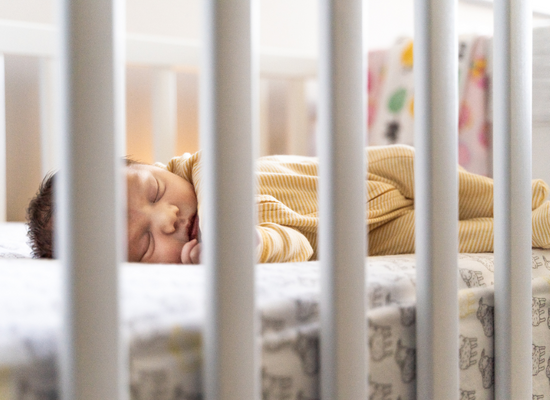Sudden Infant Death Syndrome:
What All Parents Need to Know

What is Sudden Infant Death Syndrome (SIDS)?
Sudden Infant Death Syndrome (SIDS) is a tragic event that affects approximately 1 in every 2,000 infants in the United States. SIDS is the sudden and unexpected death of an infant, under the age of one, for which no cause can be found.
What causes SIDS?
Doctors don’t know what causes SIDS, but researchers are studying the possibility that SIDS may be caused by problems with how well the brain controls breathing, heart rate/rhythm and temperature during the first few months of life.
Are there any risk-factors parents should be aware of?
The risk of SIDS increases when mothers:
- Become pregnant under the age of 20
- Smoke or vape
- Use drugs or alcohol
- Do not seek prenatal care
The risk also increases if the baby is premature, part of a multiple pregnancy (ex. Twin or Triplet), shares a bed with parents or siblings, sleeps in on a soft surface with loose blankets or pillows, is dressed too warmly or is in a very warm room.

How can parents prevent SIDS?
There are several steps parents can take to keep their infants as safe as possible.
- Babies should be on their backs for sleeping or naptime. It is important to tell this to babysitters, grandparents, and anyone who cares for your baby.
- Don’t sleep with your baby in the same bed. Have your baby sleep in a crib, cradle, or bassinet in the same room where you sleep for the first 6 months to one year
- Use a firm and flat (not inclined) sleep surface, like a mattress in a safety-approved crib
- When your baby falls asleep in their car seat, stroller, swing, infant carrier, or sling, move them to a firm, flat sleep surface as soon as possible
- Never sleep with a baby on a couch or armchair
- Keep soft items, loose bedding and toys out of the crib
- Do not use blocks or blankets to keep your baby in position
Other things you can do to prevent SIDS include:
- Getting regular prenatal care while pregnant
- Not smoking while pregnant
- Breastfeeding is best and can lower the risk of SIDS
- Going to all well-baby visits
- Making sure your baby gets their recommended vaccines (this will reduce the risk of SIDS by 50%)
- Staying with your baby when they are lying on their tummy
Ultimately, though, there is no sure way to prevent SIDS, and no exams or tests can predict whether a baby is likely to die of SIDS.
Parents should not rely on breathing (apnea) monitors, special mattresses, or other devices marketed to reduce their baby’s risk. None of these items have been proven to lower the risk of SIDS and the American Academy of Pediatrics does not advise their use.
What should parents take away from this?
Sudden Infant Death Syndrome is a tragic and unexplainable event that can happen to any family. While there are ways to reduce the risk of SIDS, there is no guaranteed way to prevent it. It is important for parents to educate themselves about the risk factors and take steps to keep their baby safe while sleeping.
Remember, SIDS is rare. Be as safe as you can, but don’t let fear keep you from enjoying your baby.

References: Healthwise articles: Sudden Infant Death Syndrome, Baby’s sleep position and SIDS, Safe Sleep for Babies, Healthy You, Healthy Baby by Customized Communications Inc. 08/2022. Arlington Texas